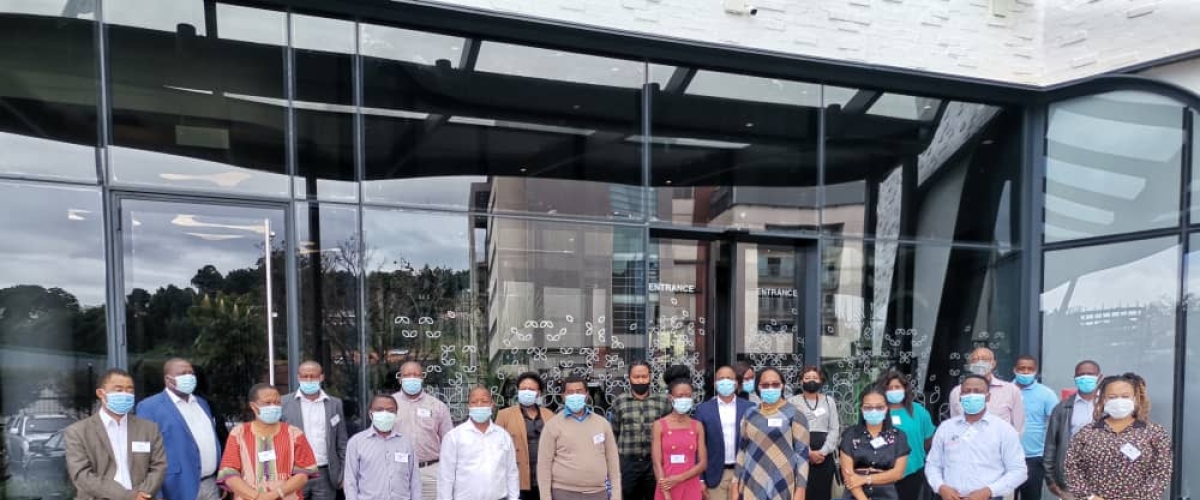
”The Kingdom of Eswatini through the Ministry of Agriculture will support and explore more collaborative opportunities with CCARDESA to improve Information, Communication, Knowledge Management strategies and data capture guidelines that will facilitate the collection of data towards meeting the national Malabo commitments”. Echoed Mr Similo Mavimbela, the Chief Research Officer (CRO) from the Department of Agricultural Research and Specialist Services (DARSS) during his opening remarks.
He said this during the one-day Knowledge Management and Data Capture stakeholder consultative meeting held at the Hilton Garden Inn, Mbabane, on the 19th of February 2021. The event was held under the support of the Comprehensive Africa Agriculture Development Programme Ex-Pillar 4 (CAADP-XP4) programme which is implemented in the SADC region by CCARDESA and is funded by the European Union (EU) and administered by International Fund for Agricultural Development (IFAD. CCARDESA collaborates with AFAAS, ASARECA, CORAF and FARA in the implementation of the programme.
The meeting was organized as a joint collaboration between CCARDESA and the Department of Agricultural Research and Specialist Services under the Ministry of Agriculture in the Kingdom of Eswatini. The purpose of the meeting was to learn from Eswatini stakeholders on how they collect Malabo Commitment data which they use towards reporting at the national, regional, and continental level. CCARDESA’s consultants virtually facilitated the meetings.
Mr. Mavimbela expressed gratitude to the stakeholders’ for attending this workshop at a very challenging time amid the COVID-19 pandemic. He thanked the European Commission (EU) and the International Fund for Agricultural Development (IFAD) through CCARDESA for availing financial assistance to support r the meeting.
Mr Mavimbela noted the rising demand for accessible and quality agricultural statistical data which he observed was unfortunately unmet due to the absence of accurate data. The SADC region has generally witnessed an unprecedented dearth of agriculture, climate change and research data, which has serious implications on the relevance of the decisions taken and on program implementation. This situation poses a substantial challenge in the preparation of reporting on the Indicators of the Malabo Declaration and the targets that have been set for biennial reviews of CAADP plans at the country level. He further indicated that it also posed challenges at the level of basing the Sustainable Development Goals (SDGs) indicators on reliable data.
Mr Mavimbela urged all participants to take the meeting seriously and provide all their required information so that CCARDESA can come up with the required final document for use in the SADC region. He posited that the contributions made in the meeting with the assistance of the consultancy, will be reflected on the regional strategy, therefore participants should apply their efforts and thoughts.
Furthermore, that Eswatini was not on track in meeting any of the 7 commitments in the Malabo Declaration. Therefore, the generation of the guidelines and use thereof will be helpful towards steering the country towards getting back on track.
The meeting was attended by stakeholders from various Departments of the Ministry of Agriculture [Research, Veterinary Services, Information and Planning], Ministry of Information Communication and Technology [Research Science Technology and Innovation Department], Ministry of Sports Youth and Culture [Youth Affairs Department], Academia, Research Institutions, Government Parastatals, Non-Governmental Organisations, Private Companies, Statisticians, Traders, Financing institutions and Media institutions.
The SADC Unit representative Miss Sandra Monsoor gave the closing remarks in which she thanked all participants and highlighted the importance of the exercise and how she was looking forward to the final draft of the regional strategy.






